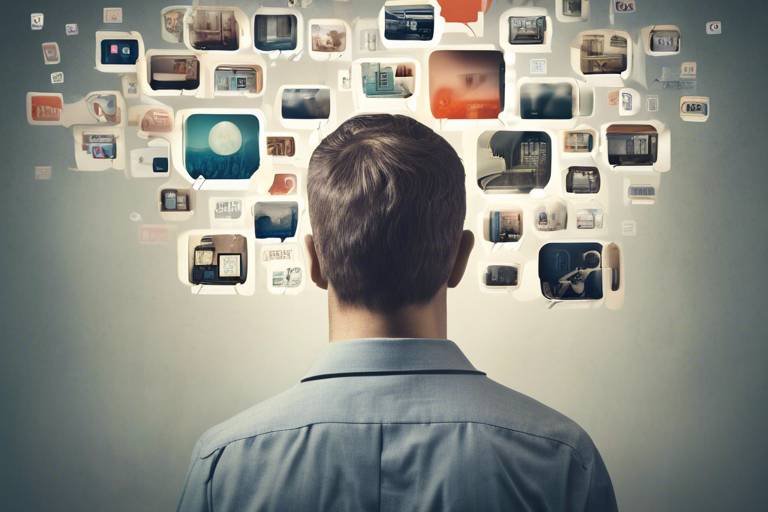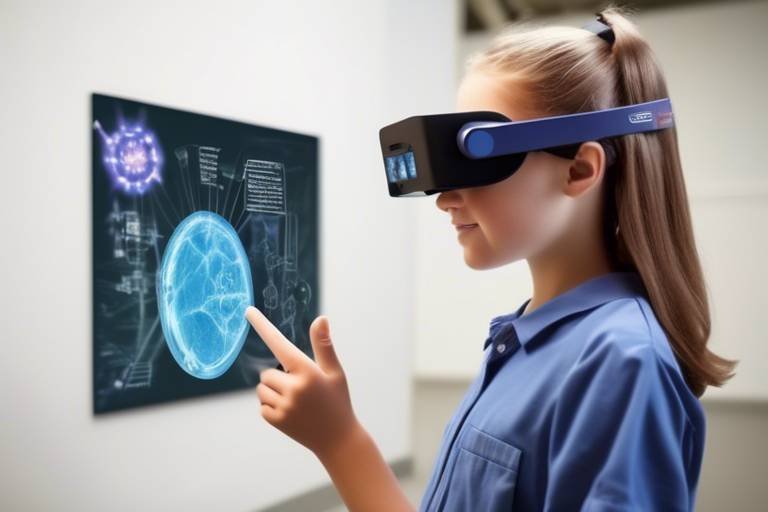How Technology is Changing the Landscape of Psychology
In today's fast-paced world, technology is not just a tool; it's a game-changer, especially in the field of psychology. The way we understand, diagnose, and treat mental health issues is undergoing a profound transformation, thanks to the advent of digital tools and platforms. Imagine being able to connect with a therapist without leaving your home, or utilizing an app that tracks your mood and provides personalized feedback. This is not science fiction; it's the new reality of psychological care.
As we delve into the various ways technology is reshaping psychology, we'll uncover the exciting developments like teletherapy, digital therapeutics, and the integration of artificial intelligence in research. Each of these advancements not only enhances accessibility but also enriches the therapeutic experience for individuals seeking help. The traditional barriers to mental health care—like distance, stigma, and even time constraints—are slowly being dismantled, paving the way for a more inclusive and effective approach to mental well-being.
Furthermore, we must consider the implications of these advancements. While technology offers incredible opportunities, it also presents challenges that need to be addressed. Issues like data privacy, ethical considerations, and the digital divide must be navigated carefully to ensure that technology serves as a bridge rather than a barrier. In this article, we will explore both the bright prospects and the potential pitfalls of technology in psychology, aiming to provide a comprehensive overview of this rapidly evolving landscape.
So, buckle up as we embark on this journey through the digital revolution in psychology! From the rise of teletherapy to the innovative use of AI in research, we'll explore how these changes are not just improving access to care but also enhancing the way we understand the human mind.
- What is teletherapy? Teletherapy refers to therapy sessions conducted through digital platforms, allowing individuals to receive mental health support from the comfort of their homes.
- How do digital therapeutics work? Digital therapeutics provide evidence-based interventions via software, enhancing traditional treatment methods and offering additional support for various mental health conditions.
- What role does AI play in psychological research? AI analyzes large datasets to identify patterns and enhance predictive models, leading to a deeper understanding of human behavior.
- Can social media positively impact mental health? Yes, social media can foster connections and provide communities for support, helping to reduce feelings of isolation.
- What are the ethical considerations of using technology in psychology? Ethical considerations include data privacy, consent, and the potential for bias in algorithmic decision-making.

The Rise of Teletherapy
Teletherapy has truly revolutionized the landscape of mental health care, breaking down barriers that once made accessing therapy a daunting task for many. Imagine being able to connect with a therapist from the comfort of your own home, in your pajamas, sipping on your favorite tea. Sounds cozy, right? This shift towards digital platforms has made therapy not just more accessible, but also more flexible, allowing individuals to schedule sessions that fit their busy lives.
One of the most significant benefits of teletherapy is its ability to reach those who might otherwise be unable to access traditional therapy. For instance, individuals living in remote areas, those with disabilities, or even those who simply feel more comfortable discussing their feelings from a familiar environment can greatly benefit from this approach. Teletherapy eliminates the need for travel, saving time and reducing anxiety associated with in-person visits.
Moreover, the variety of platforms available for teletherapy—ranging from video calls to chat-based services—means that clients can choose the method that feels most comfortable for them. This personalization enhances the therapeutic experience, making it more effective. In fact, studies have shown that many clients report feeling just as connected to their therapists through a screen as they do face-to-face. Isn’t that fascinating?
However, like any innovation, teletherapy comes with its own set of challenges. Issues such as internet connectivity, technical difficulties, and concerns about privacy can arise. It's essential for both therapists and clients to be aware of these potential hurdles. For instance, a stable internet connection is crucial for a smooth session, and therapists should ensure that they are using secure platforms to protect client confidentiality.
As we look to the future, the rise of teletherapy is likely to continue. With the increasing integration of technology in our daily lives, mental health care will evolve alongside it. The potential for teletherapy to incorporate advanced tools, such as virtual reality or AI-driven assessments, is exciting and could lead to even more personalized and effective treatment options.
| Benefits of Teletherapy | Challenges of Teletherapy |
|---|---|
| Increased accessibility | Internet connectivity issues |
| Flexible scheduling | Technical difficulties |
| Comfort of home | Privacy concerns |
In conclusion, teletherapy is not just a trend; it's a transformative approach to mental health care that is here to stay. As we continue to embrace technology in our lives, the possibilities for enhancing psychological support through digital means are endless. So, whether you're considering your first therapy session or are a seasoned pro, teletherapy might just be the perfect fit for your mental health journey.

Digital Therapeutics
In recent years, have emerged as a groundbreaking approach to mental health treatment, bridging the gap between traditional therapy and modern technology. These are evidence-based therapeutic interventions delivered via software programs, designed to enhance the effectiveness of conventional treatment methods. Imagine having a therapist in your pocket, available at any time, ready to guide you through your mental health journey. That’s the power of digital therapeutics!
These innovative solutions are particularly beneficial for individuals dealing with various mental health conditions, such as depression, anxiety, and PTSD. By utilizing algorithms and data-driven insights, digital therapeutics can offer personalized treatment plans that adapt to the user’s progress. This level of customization is akin to having a tailored suit—one that fits just right, enhancing your overall experience and effectiveness in managing your mental health.
One of the most exciting aspects of digital therapeutics is their ability to provide additional support outside of traditional therapy sessions. Users can engage with interactive modules, complete exercises, and track their progress through user-friendly interfaces. This constant engagement helps to reinforce the skills learned in therapy, making the therapeutic process more dynamic and effective. For instance, a digital therapeutic program might include:
- Interactive exercises to challenge negative thought patterns
- Daily mood tracking to identify triggers and patterns
- Guided mindfulness practices to promote relaxation and focus
Additionally, the accessibility of digital therapeutics cannot be overstated. With just a smartphone or tablet, individuals can access a wealth of resources and tools that were once limited to in-person sessions. This democratization of mental health care means that more people can receive the help they need, regardless of geographical or financial constraints. However, it’s essential to recognize that while digital therapeutics are a valuable resource, they are not a replacement for professional therapy. Instead, they serve as a complementary tool that can enhance the overall therapeutic experience.
As we look to the future, the integration of digital therapeutics into mental health care is expected to grow exponentially. With advancements in technology and a deeper understanding of mental health, these tools will continue to evolve, providing even more comprehensive support to individuals in need. The potential for innovation is limitless, and as we embrace this digital shift, we can expect to see a transformation in how we approach mental health treatment.
Q: What are digital therapeutics?
A: Digital therapeutics are evidence-based therapeutic interventions delivered through software programs designed to support individuals with mental health conditions.
Q: How do digital therapeutics differ from traditional therapy?
A: While traditional therapy involves in-person sessions with a mental health professional, digital therapeutics provide accessible, interactive tools that can be used at any time to complement traditional treatment.
Q: Can digital therapeutics replace therapy?
A: No, digital therapeutics are meant to enhance traditional therapy, not replace it. They provide additional support and resources for individuals on their mental health journey.
Q: Are digital therapeutics effective?
A: Yes, many digital therapeutics have been shown to be effective in treating various mental health conditions, particularly when used alongside traditional therapeutic methods.

Mobile Apps for Mental Health
In today's fast-paced world, have emerged as a lifeline for many individuals seeking support and guidance. These apps are designed to fit seamlessly into our daily routines, allowing users to access mental health resources anytime and anywhere. Imagine having a therapist in your pocket, ready to help you navigate the ups and downs of life with just a few taps on your smartphone. This is the reality that mental health apps offer, and their popularity is skyrocketing.
One of the most appealing aspects of these apps is their user-friendly design. They often feature intuitive interfaces that make it easy for anyone, regardless of their tech-savviness, to engage with the content. For example, many apps provide tools for self-assessment, enabling users to track their mood and identify patterns over time. This self-awareness is crucial in managing mental health, as it empowers individuals to recognize triggers and seek help when needed.
Moreover, mobile apps often include guided mindfulness practices, which help users cultivate a sense of calm and focus amidst the chaos of daily life. These practices can range from simple breathing exercises to more structured meditation sessions. By incorporating these techniques into their daily routines, users can enhance their overall well-being and develop healthier coping mechanisms.
To further illustrate the impact of mobile apps on mental health, consider the following table showcasing some popular mental health apps and their key features:
| App Name | Key Features | Target Audience |
|---|---|---|
| Headspace | Guided meditation, sleep aids, mindfulness exercises | Individuals seeking mindfulness and stress relief |
| Woebot | AI chatbot, cognitive behavioral therapy (CBT) techniques | Those looking for conversational support |
| Calm | Sleep stories, relaxation music, meditation | Anyone needing help with sleep and relaxation |
| MyTherapy | Medication reminders, mood tracking, health journal | Individuals managing medication and mental health |
While the benefits of these apps are clear, it's essential to acknowledge that they are not a one-size-fits-all solution. Each individual's needs and preferences vary, which is why having a diverse range of options is crucial. Some users may prefer structured programs, while others might thrive with more flexible, self-guided resources. This variety ensures that everyone can find a tool that resonates with their personal journey.
However, it's important to approach these apps with a critical eye. Not all mental health apps are created equal, and some may lack the evidence-based content necessary to provide genuine support. Users should look for apps that are developed by qualified professionals and backed by research to ensure they are receiving quality information and guidance. Furthermore, privacy concerns are a significant issue; users must be cautious about sharing personal information and ensure that the apps they choose prioritize data security.
In conclusion, mobile apps for mental health are reshaping the landscape of mental health care, offering accessible and flexible support to individuals everywhere. As technology continues to evolve, these tools will likely become even more sophisticated, providing users with tailored experiences that cater to their unique needs. By embracing these innovations, we can foster a culture of mental wellness that empowers everyone to take charge of their mental health.
- Are mental health apps effective? Yes, many mental health apps have been shown to be effective in providing support and resources, especially when used in conjunction with traditional therapy.
- Can I rely solely on a mental health app for treatment? While apps can be a valuable tool, they should not replace professional help. It's best to use them as a supplement to therapy or counseling.
- How do I choose the right mental health app? Look for apps that are evidence-based, developed by professionals, and have positive user reviews. Consider your personal needs and preferences as well.
- Are my personal data and privacy safe with these apps? Always check the app's privacy policy and ensure it prioritizes user data security before sharing any personal information.

Features of Effective Mental Health Apps
In today's fast-paced world, mental health apps have emerged as a beacon of hope for many individuals seeking support and guidance. To truly make a difference, these applications must possess certain key features that enhance user experience and promote effective mental health management. First and foremost, an effective mental health app should have a user-friendly interface. Imagine trying to navigate a complicated maze when all you want is a way out; similarly, a confusing app can deter users from seeking the help they need. A clean, intuitive design ensures that users can easily access resources and tools without feeling overwhelmed.
Moreover, the content within these apps should be evidence-based. This means that the strategies and techniques provided are backed by scientific research, offering users reliable methods to cope with their mental health challenges. Whether it's cognitive-behavioral therapy exercises or mindfulness techniques, having content grounded in research builds trust and effectiveness. Additionally, personalized feedback is another crucial feature. Imagine receiving tailored insights that resonate with your specific experiences; this kind of customization not only enhances engagement but also fosters a deeper connection between the user and the app.
Furthermore, many effective mental health apps incorporate goal-setting functionalities. Users can set personal milestones, track their progress, and celebrate small victories along the way. This not only instills a sense of achievement but also encourages continuous use of the app. To illustrate, a user might set a goal to practice mindfulness for five minutes daily, and the app can send reminders and track adherence, making the journey towards mental wellness more tangible and rewarding.
Another critical aspect is the inclusion of community support features. Many users find solace in connecting with others who share similar struggles. By offering forums or chat functionalities, these apps can create a safe space for users to exchange experiences, advice, and encouragement. However, while community support can be beneficial, it's essential that these interactions are moderated to ensure a safe and respectful environment.
Lastly, data privacy and security cannot be overlooked. Users must feel confident that their personal information is protected. Therefore, effective mental health apps should implement robust security measures, such as encryption and anonymization, to safeguard user data. After all, when it comes to mental health, trust is paramount, and users should never feel hesitant to share their thoughts and feelings due to privacy concerns.
In summary, the most effective mental health apps combine a user-friendly design, evidence-based content, personalized feedback, goal-setting features, community support, and stringent data privacy measures. These elements work together to create an environment where users can thrive and take charge of their mental health journey.
- What are mental health apps? Mental health apps are digital tools designed to help individuals manage their mental health through various features, including self-assessment, mood tracking, and therapeutic exercises.
- Are mental health apps effective? Yes, when designed with evidence-based content and user-friendly features, mental health apps can be effective tools for managing mental health.
- How do I choose the right mental health app? Look for apps with a user-friendly interface, evidence-based practices, personalized feedback, and strong privacy protections.
- Can mental health apps replace therapy? While they can be helpful, mental health apps should complement traditional therapy rather than replace it, especially for more severe mental health conditions.

Challenges in App Utilization
While the rise of mental health apps has brought a wave of innovation and accessibility to psychological support, it is essential to recognize that these digital tools are not without their challenges. One of the most pressing issues is privacy concerns. Many users may hesitate to share sensitive information with apps due to fears of data breaches or misuse of personal information. The reality is that, as our lives become increasingly digitized, the stakes of protecting our mental health data grow higher. For instance, if a user discloses their struggles with anxiety or depression, they deserve to know that this information is safeguarded against unauthorized access.
Another significant hurdle is the digital divide. Not everyone has equal access to technology, which can create disparities in who benefits from these mental health apps. Individuals in rural areas or those from lower socioeconomic backgrounds may lack reliable internet access or smartphones capable of running the latest apps. This inequality can lead to a situation where only a segment of the population can leverage these innovative tools, leaving others without the support they need.
Moreover, the effectiveness of mental health apps can vary widely. Users may find themselves overwhelmed by the sheer number of available options, leading to decision fatigue. With so many apps promising to improve mental well-being, individuals might struggle to choose the right one for their specific needs. This confusion can result in frustration and ultimately discourage users from seeking help altogether.
Additionally, the quality of content within these apps is crucial. Not all mental health apps are created equal; some may lack evidence-based practices or professional oversight. This raises the risk of individuals relying on unverified information, which could potentially hinder their progress. Therefore, it’s vital for users to seek out apps that are backed by research and developed by qualified professionals.
In summary, while mental health apps hold immense potential for enhancing psychological support, challenges such as privacy concerns, digital accessibility, decision fatigue, and varying content quality must be addressed. By recognizing these issues, developers and users alike can work towards creating a more inclusive and effective mental health landscape.
- What are mental health apps? Mental health apps are digital tools designed to support individuals in managing their mental well-being through various features like mood tracking, guided meditations, and self-assessment tools.
- Are mental health apps effective? The effectiveness of mental health apps can vary; some are supported by research and designed by professionals, while others may lack proper oversight. It's essential to choose apps that are evidence-based.
- How can I ensure my privacy while using mental health apps? Look for apps that prioritize user privacy, offer encryption, and have transparent data policies. Always read the terms and conditions before sharing personal information.
- Can mental health apps replace traditional therapy? While mental health apps can provide valuable support, they should not replace professional therapy for individuals with severe mental health issues. They can be used as a supplementary tool.

Virtual Reality in Therapy
Imagine stepping into a world where your fears and anxieties can be confronted without ever leaving your home. Virtual reality (VR) is doing just that in the realm of therapy, offering a groundbreaking approach that allows clients to experience immersive environments tailored to their specific needs. This innovative technology is not just a gimmick; it’s a powerful tool that is reshaping how we think about mental health treatment.
VR therapy provides a unique opportunity for individuals to face their fears in a controlled setting. For instance, someone with a fear of heights can don a VR headset and find themselves standing on the edge of a virtual cliff. This method, known as exposure therapy, allows clients to gradually confront their fears, leading to desensitization and a reduction in anxiety. The key here is that they can do so in a safe environment, where they can learn coping strategies without the real-world consequences of facing their fears head-on.
Moreover, VR isn’t limited to just phobias. It has been effectively used for a range of mental health issues, including post-traumatic stress disorder (PTSD), anxiety disorders, and even social skills training. Through simulated social interactions, individuals can practice and enhance their social skills, gaining confidence in their ability to engage with others. This immersive experience can feel more real than traditional role-playing exercises, making it a valuable addition to therapeutic practices.
But what makes VR therapy truly remarkable is its adaptability. Therapists can customize virtual environments to cater to the individual needs of their clients. For example, a therapist might create a calming beach scene for someone dealing with stress or a bustling café for someone working on social anxiety. This level of personalization can lead to more effective therapy sessions, as clients feel more engaged and connected to the process.
However, as with any emerging technology, there are challenges to consider. Not everyone has access to VR equipment, which can create a disparity in who can benefit from these innovative therapies. Additionally, there are concerns regarding the potential for over-reliance on technology in treatment, as well as the need for proper training for therapists to effectively use VR tools in their practice.
In conclusion, virtual reality is paving the way for a new frontier in therapy, offering clients a unique and engaging way to confront their challenges. As technology continues to evolve, we can expect to see even more advancements in this area, making mental health treatment more accessible and effective for everyone.
- What is virtual reality therapy?
It is a therapeutic approach that uses immersive virtual environments to help clients confront their fears and practice social skills in a controlled setting. - How effective is VR therapy?
Research shows that VR therapy can be highly effective for various mental health conditions, particularly phobias, PTSD, and anxiety disorders. - Do I need special equipment for VR therapy?
Yes, VR therapy typically requires a VR headset and compatible software, which may not be accessible to everyone. - Is VR therapy safe?
When conducted by trained professionals, VR therapy is considered safe. However, it’s important to discuss any concerns with your therapist.

AI in Psychological Research
The integration of artificial intelligence (AI) into psychological research is nothing short of a game-changer. Imagine having a supercharged assistant that can sift through mountains of data in seconds, uncovering patterns and insights that would take humans years to identify. That's the power of AI! Researchers are now leveraging algorithms to analyze vast datasets, which enables them to gain a deeper understanding of human behavior and mental processes.
One of the most exciting aspects of AI in psychology is its ability to enhance predictive models. By analyzing historical data, AI can help researchers predict outcomes in various psychological studies with remarkable accuracy. This not only improves the quality of research but also aids in developing more effective treatment methods for mental health conditions. For instance, AI can identify risk factors for depression or anxiety by analyzing social media activity, biometric data, and even language patterns in written communication.
Moreover, machine learning algorithms are at the forefront of this revolution. These algorithms learn from data over time, refining their predictions and analyses as they go. This means that as more data is fed into the system, the insights become increasingly nuanced and relevant. For example, a machine learning model might analyze patient responses to therapy and identify which techniques yield the best results for specific demographics. This could lead to a more personalized approach to therapy, where treatments are tailored to individual needs based on empirical evidence.
However, the rise of AI in psychological research is not without its challenges. The ethical implications are significant and cannot be ignored. Issues such as data privacy, informed consent, and potential biases in algorithmic decision-making must be addressed. For example, if an AI system is trained on biased data, it may perpetuate those biases in its findings, leading to skewed results that could adversely affect certain groups of people. Therefore, researchers must approach the integration of AI with caution and a strong ethical framework.
To navigate these complexities, a collaborative approach involving psychologists, data scientists, ethicists, and policymakers is essential. By working together, these stakeholders can ensure that AI tools are used responsibly and effectively in psychological research. The potential for AI to revolutionize our understanding of the mind is immense, but it requires a commitment to ethical standards and rigorous oversight.
In summary, the incorporation of AI into psychological research is paving the way for groundbreaking advancements. With its ability to analyze data at unprecedented speeds and accuracy, AI is not just a tool but a partner in the quest to understand the complexities of human behavior. As we continue to embrace this technology, it is crucial to remain vigilant about the ethical considerations that come with it, ensuring that the benefits of AI are realized without compromising the integrity of psychological research.
- What role does AI play in psychological research? AI assists in analyzing large datasets, identifying patterns, and enhancing predictive models, leading to a better understanding of human behavior.
- Are there ethical concerns regarding AI in psychology? Yes, concerns include data privacy, consent, and potential biases in algorithmic decision-making that need careful consideration.
- How can AI improve treatment methods in psychology? By analyzing patient data, AI can help identify which treatments work best for specific demographics, allowing for more personalized approaches.

Machine Learning Applications
Machine learning (ML) is making significant strides in the field of psychology, revolutionizing the way researchers and practitioners understand human behavior. Imagine having a powerful assistant that can sift through mountains of data, spotting trends and patterns that might elude even the most experienced psychologist. That’s precisely what machine learning algorithms are doing. By analyzing vast datasets, these algorithms can identify correlations and insights that help in predicting mental health outcomes, tailoring interventions, and even personalizing treatment plans.
One of the most fascinating applications of machine learning in psychology is its ability to predict mental health issues before they escalate. For instance, researchers can use ML to analyze social media activity, text messages, or even voice recordings to detect early signs of anxiety or depression. This proactive approach allows for timely intervention, which can be crucial in preventing more severe mental health crises. Additionally, machine learning models can be trained to recognize the effectiveness of various therapeutic approaches based on individual responses, thus optimizing treatment strategies.
Moreover, machine learning can enhance diagnostic accuracy. Traditional diagnostic methods often rely on subjective interpretations and can vary significantly between practitioners. However, with machine learning, algorithms can analyze patient data and compare it with a broad range of psychological profiles, leading to more consistent and objective diagnoses. This can be particularly beneficial in complex cases where symptoms overlap between different disorders.
To illustrate the impact of machine learning in psychological research, consider the following table that summarizes some key applications:
| Application | Description | Benefits |
|---|---|---|
| Predictive Analytics | Identifying potential mental health crises through data analysis. | Early intervention and prevention of severe outcomes. |
| Personalized Treatment Plans | Tailoring therapies based on individual responses to interventions. | Increased effectiveness and patient satisfaction. |
| Diagnostic Support | Enhancing diagnostic accuracy through data comparison. | More consistent and reliable diagnoses. |
However, while the benefits of machine learning in psychology are promising, it’s essential to approach its integration with caution. Ethical considerations, such as data privacy and the potential for algorithmic bias, must be addressed to ensure that these technologies serve all individuals equitably. As the field continues to evolve, it’s crucial to strike a balance between leveraging the power of machine learning and maintaining the human touch that is so vital in psychological practice.
- What is machine learning in psychology? Machine learning in psychology refers to the use of algorithms and statistical models to analyze data and identify patterns related to human behavior, aiding in diagnosis and treatment.
- How can machine learning predict mental health issues? By analyzing data from various sources, such as social media and patient records, machine learning can identify early warning signs of mental health conditions, allowing for timely interventions.
- Are there ethical concerns with using machine learning in psychology? Yes, ethical concerns include data privacy, the potential for bias in algorithms, and ensuring that interventions are equitable and accessible to all populations.

Ethical Considerations of AI
The integration of artificial intelligence (AI) into the field of psychology is a double-edged sword. While AI has the potential to revolutionize how we understand and treat mental health issues, it also raises a myriad of ethical concerns that cannot be overlooked. One of the most pressing issues is data privacy. With AI systems processing vast amounts of sensitive personal information, the risk of data breaches and unauthorized access becomes a significant concern. How can we ensure that individuals' mental health data is kept confidential and secure?
Another critical consideration is informed consent. Patients must be fully aware of how their data will be used, and they should have the right to opt-out of data collection without losing access to necessary services. This is particularly important in psychology, where trust between therapist and client is paramount. Additionally, the algorithms that power AI systems can sometimes be opaque, making it difficult for users to understand how decisions are made. This lack of transparency can lead to a sense of distrust and unease among patients.
Moreover, there is the issue of algorithmic bias. AI systems are only as good as the data they are trained on. If the data reflects societal biases—whether based on race, gender, or socioeconomic status—then the AI can perpetuate these biases in its recommendations and insights. This raises the question: how do we ensure that AI tools are equitable and do not inadvertently harm marginalized groups?
To address these ethical dilemmas, it is essential to establish a framework that prioritizes ethical standards in AI development and implementation. This could involve:
- Regular audits of AI systems to assess their fairness and accuracy.
- Involving diverse stakeholders in the development process to ensure a wide range of perspectives are considered.
- Creating clear guidelines for data usage and informed consent.
As we continue to explore the intersection of AI and psychology, it is crucial to engage in ongoing discussions about these ethical considerations. By doing so, we can harness the benefits of AI while safeguarding the rights and well-being of individuals seeking mental health support.
Q: What are the main ethical concerns surrounding AI in psychology?
A: The primary concerns include data privacy, informed consent, algorithmic bias, and transparency in decision-making processes.
Q: How can we ensure data privacy when using AI in mental health?
A: Implementing robust security measures, regular audits, and clear data usage policies can help protect individuals' sensitive information.
Q: Is AI biased?
A: Yes, AI can reflect societal biases if it is trained on biased data. This is why it's crucial to use diverse and representative datasets in AI training.
Q: How can patients ensure their rights are protected when using AI tools?
A: Patients should seek out services that prioritize transparency in data usage and provide clear information about how their data will be handled.

Social Media's Impact on Mental Health
In our hyper-connected world, social media has become a double-edged sword when it comes to mental health. On one hand, it offers a platform for connection, support, and community that can be incredibly beneficial; on the other hand, it can also lead to feelings of isolation, inadequacy, and anxiety. Have you ever scrolled through your feed and felt a twinge of envy or sadness as you compared your life to the seemingly perfect lives of others? This phenomenon is more common than you think, and it raises important questions about how we engage with these digital platforms.
Social media platforms like Facebook, Instagram, and Twitter have transformed the way we interact with one another. They allow us to stay in touch with friends and family, share our experiences, and even seek out support during tough times. For many, these platforms serve as a lifeline, particularly for those who may feel isolated in their daily lives. Online communities can provide a sense of belonging, allowing individuals to connect with others who share similar struggles or interests. This can be especially valuable for people dealing with mental health issues, as it helps reduce feelings of loneliness.
However, the impact of social media isn't all positive. The constant exposure to curated images and highlight reels can distort our self-perception and lead to unhealthy comparisons. Studies have shown that excessive use of social media can contribute to increased levels of anxiety and depression, particularly among younger users. A survey conducted by the Pew Research Center found that 69% of teens feel pressure to show only the best versions of themselves online. This pressure can create a cycle of negative self-esteem and mental health struggles.
Moreover, the addictive nature of social media can lead to compulsive behaviors, where individuals find themselves mindlessly scrolling for hours. This not only takes away valuable time that could be spent on self-care or real-life interactions but also reinforces feelings of inadequacy and anxiety. It's essential to recognize how our social media habits can impact our mental health and take steps to create a more balanced relationship with these platforms.
To better understand the complex relationship between social media and mental health, let's take a look at some of the positive and negative effects:
| Positive Effects | Negative Effects |
|---|---|
|
|
As we navigate this digital landscape, it's crucial to be mindful of our social media usage. Setting boundaries, curating our feeds, and taking regular breaks can help mitigate the negative effects while still allowing us to enjoy the benefits of connection and support. Remember, it's all about finding a balance that works for you.
Q: How can I use social media positively for my mental health?
A: Focus on following accounts that inspire and uplift you. Engage in supportive communities and limit your exposure to negative content.
Q: What are some signs that social media is negatively affecting my mental health?
A: If you find yourself feeling anxious, inadequate, or depressed after using social media, it may be time to reevaluate your habits.
Q: How can I create a healthier relationship with social media?
A: Set time limits for usage, take regular breaks, and be intentional about the content you consume. Remember, your mental health should always come first!

Positive Effects of Social Media
In today's fast-paced world, social media has become an integral part of our daily lives. It serves as a powerful platform that connects people from all walks of life, bridging geographical gaps and fostering relationships that might not have been possible otherwise. One of the most significant positive effects of social media is its ability to create communities. These online spaces allow individuals to find others who share similar interests, experiences, or challenges, making it easier to seek support and understanding.
For instance, consider someone dealing with a mental health issue. They might feel isolated and alone, but through platforms like Facebook, Twitter, or Instagram, they can join groups dedicated to their specific struggles. This sense of community can be incredibly empowering, as it not only provides emotional support but also encourages sharing of resources and coping strategies. In this way, social media acts as a lifeline, reminding individuals that they are not alone in their battles.
Moreover, social media plays a crucial role in raising awareness about mental health issues. Campaigns and hashtags like #MentalHealthAwareness have gained traction, helping to destigmatize conversations around mental health. This increased visibility can lead to more people seeking help and support, as they feel more comfortable discussing their challenges. The ability to share personal stories and experiences can inspire others to take action, whether that means seeking therapy or simply talking to a friend.
Another noteworthy benefit is the access to information and resources that social media provides. Users can follow mental health professionals, organizations, and advocates who share valuable insights, tips, and coping mechanisms. This democratization of information empowers individuals to take charge of their mental well-being. For example, platforms like YouTube offer a plethora of videos on mindfulness practices, coping strategies, and even guided meditations, making mental health resources more accessible than ever before.
However, it's essential to approach social media with a balanced mindset. While it has undeniable benefits, users should be mindful of their engagement levels. Too much time spent scrolling through feeds can lead to comparison and negative self-perception. Thus, it becomes crucial to curate one's online experience—following accounts that promote positivity and self-care while avoiding those that invoke feelings of inadequacy.
In conclusion, social media is a double-edged sword, but when used thoughtfully, it can significantly enhance our mental health landscape. By fostering connections, raising awareness, and providing access to valuable resources, social media can serve as a powerful ally in our journey toward better mental health. So, the next time you log in, remember the potential for positivity that lies within those digital connections!
- How can I use social media to improve my mental health?
Engage with supportive communities, follow mental health advocates, and seek out positive content that resonates with you.
- What should I do if social media negatively impacts my mental health?
Consider taking breaks, curating your feed to include positive influences, and setting limits on your usage.
- Are there specific platforms better for mental health support?
Platforms like Facebook and Reddit often host support groups, while Instagram can provide inspiration through mental health-focused accounts.

Negative Effects of Social Media
While social media can be a powerful tool for connection and community, it also harbors a darker side that can significantly impact mental health. One of the most pressing issues is the phenomenon of comparison culture. Users often find themselves scrolling through curated highlight reels of others' lives, which can lead to feelings of inadequacy and low self-esteem. It’s like walking through a gallery of perfection, where everyone else seems to have it all together while you’re left feeling like an outsider. This constant comparison can spiral into anxiety and depression, particularly among younger users who are still developing their self-identity.
Moreover, the addictive nature of social media can lead to excessive usage, which has been linked to a range of mental health issues. Research shows that spending too much time on these platforms can disrupt sleep patterns, reduce productivity, and even lead to social isolation. Ironically, while social media is meant to connect us, it can create a false sense of belonging that leaves individuals feeling lonelier than ever. The fear of missing out (FOMO) can exacerbate these feelings, pushing users to check their feeds incessantly, which only deepens their sense of disconnection.
Another significant concern is the prevalence of cyberbullying. Unlike traditional bullying, which is often confined to physical spaces, cyberbullying can follow individuals into their homes and personal lives. The anonymity provided by social media platforms can embolden bullies, making it easier for them to target victims without facing immediate repercussions. This can lead to severe emotional distress and can even result in tragic outcomes. Victims of cyberbullying often experience a range of negative effects, including anxiety, depression, and in extreme cases, suicidal thoughts.
Furthermore, the misinformation that spreads across social media can create a toxic environment that affects mental well-being. False information regarding mental health, body image, and lifestyle choices can lead to harmful behaviors and beliefs. For instance, unrealistic portrayals of body standards can contribute to eating disorders and body dysmorphia, especially among impressionable adolescents. The pressure to conform to these standards can become overwhelming and detrimental to one’s mental health.
To illustrate the negative effects of social media, consider the following table that summarizes some of the key issues:
| Negative Effects | Description |
|---|---|
| Comparison Culture | Feeling inadequate due to constant comparison with others' curated lives. |
| Addiction | Excessive use leading to sleep disruption, reduced productivity, and social isolation. |
| Cyberbullying | Online harassment that can lead to severe emotional distress and isolation. |
| Misinformation | Spread of false information affecting beliefs and behaviors regarding mental health. |
In conclusion, while social media can be a double-edged sword, it’s crucial to approach it with awareness and mindfulness. Recognizing these negative effects can empower users to take control of their social media habits, fostering a healthier relationship with these platforms. Balancing online interactions with real-life connections and being critical of the content consumed can mitigate some of the adverse impacts on mental health.
- How can I reduce anxiety caused by social media? Consider setting time limits on your social media usage and curating your feed to include positive and uplifting content.
- What should I do if I'm a victim of cyberbullying? Reach out to trusted friends or family members, and consider reporting the behavior to the platform.
- Can social media ever be beneficial for mental health? Yes, when used mindfully, social media can provide support and foster connections, especially for those feeling isolated.

Future Trends in Psychological Technology
The future of psychology is not just a distant dream; it's unfolding right before our very eyes, driven by rapid advancements in technology. As we stand on the brink of a new era in mental health care, the integration of innovative tools is set to transform how we understand and treat psychological issues. Imagine a world where mental health solutions are personalized, accessible, and effective, all thanks to the power of technology. This is not science fiction; it's the reality we're heading towards.
One of the most exciting trends is the rise of wearable technology. Devices like smartwatches and fitness trackers are evolving beyond mere health monitoring. They're becoming sophisticated tools that can help track emotional states, stress levels, and even provide real-time feedback to users. For example, a smartwatch might alert you when your heart rate spikes, suggesting you take a moment to practice mindfulness. This kind of immediate feedback can empower individuals to take charge of their mental health in ways never possible before.
Moreover, advancements in artificial intelligence (AI) are paving the way for more personalized mental health solutions. AI can analyze user data to tailor interventions that meet individual needs. This is akin to having a personal therapist available at your fingertips, guiding you through challenging moments with customized strategies. Imagine an AI that learns your preferences, understands your triggers, and provides you with tools that resonate with your unique experiences. The potential here is enormous, but it also raises important questions about ethics and privacy that we must navigate carefully.
Additionally, the concept of virtual reality (VR) therapy is gaining traction. VR technology allows individuals to immerse themselves in controlled environments where they can confront their fears or practice social interactions without the real-world consequences. For instance, someone with social anxiety could use VR to simulate a party scenario, helping them build confidence in a safe space. This innovative approach not only makes therapy more engaging but also provides a unique avenue for healing and growth.
As we look to the future, we must also consider the role of community-based digital platforms. These platforms can connect individuals with similar experiences, creating supportive networks that transcend geographical boundaries. Imagine being part of a global community where you can share your journey, seek advice, and find solace in knowing you're not alone. This sense of belonging can significantly enhance mental well-being, making psychological support more accessible than ever.
However, with all these advancements come challenges. The digital divide remains a significant barrier, as not everyone has equal access to technology. We must strive to ensure that these innovative solutions are available to all, regardless of socioeconomic status. Moreover, as we embrace these technologies, we must also prioritize data privacy and ensure that users' information is protected. Ethical considerations should be at the forefront of technological integration in psychology to foster trust and safety among users.
In conclusion, the future of psychological technology is bright, filled with possibilities that can revolutionize mental health care. As we embrace these changes, let’s remain vigilant about the ethical implications and work towards creating a landscape where everyone has access to the mental health support they need. The journey ahead is exciting, and together, we can shape a future where mental well-being is prioritized and accessible to all.
- What are wearable technologies in mental health? Wearable technologies are devices that monitor health metrics, including emotional states and stress levels, helping users manage their mental health proactively.
- How does AI personalize mental health care? AI analyzes user data to provide tailored interventions and strategies that cater to individual needs, making mental health support more effective.
- What is VR therapy? VR therapy immerses individuals in simulated environments to confront fears or practice social skills, offering a unique and engaging therapeutic experience.
- How can community-based platforms help? These platforms connect individuals with similar experiences, fostering a sense of belonging and providing support across geographical boundaries.
- What challenges do we face with technological advancements? Key challenges include the digital divide, ensuring equitable access to technology, and addressing ethical concerns related to data privacy.
Frequently Asked Questions
- What is teletherapy and how does it work?
Teletherapy is a form of therapy that takes place over digital platforms, allowing individuals to receive mental health support from the comfort of their own homes. It typically involves video calls, phone calls, or messaging with a licensed therapist, making it more accessible for those who may face barriers to traditional in-person therapy.
- Are digital therapeutics effective?
Yes, digital therapeutics have been shown to be effective as they provide evidence-based interventions through software programs. They can enhance traditional treatment methods and offer additional support for various mental health conditions, making them a valuable tool in modern psychology.
- What features should I look for in a mental health app?
Effective mental health apps usually have user-friendly interfaces, evidence-based content, and personalized feedback. These features ensure that users can easily navigate the app and receive the right support for managing their mental health.
- What challenges do mental health apps face?
Despite their benefits, mental health apps encounter challenges such as privacy concerns and the digital divide. These issues can impact the effectiveness and accessibility of these tools for various populations, making it essential to address them for broader reach.
- How is virtual reality used in therapy?
Virtual reality (VR) is utilized in therapeutic settings to help clients confront fears, practice social skills, and experience immersive environments. This innovative approach can facilitate healing and growth by providing a safe space for individuals to explore their emotions and behaviors.
- What role does AI play in psychological research?
Artificial intelligence is revolutionizing psychological research by analyzing vast datasets and identifying patterns. This leads to more informed understandings of human behavior and enhances predictive models, ultimately improving the quality of psychological studies.
- What are the ethical considerations of using AI in psychology?
The integration of AI in psychology raises important ethical questions regarding data privacy, consent, and the potential for bias in algorithmic decision-making. It is crucial to carefully consider and regulate these aspects to ensure ethical practices in psychological research and treatment.
- How does social media impact mental health?
Social media can have both positive and negative effects on mental health. It fosters connections and communities for support, but excessive use can lead to anxiety, depression, and negative self-image. It's essential to maintain a balanced engagement with social media to promote mental well-being.
- What are the future trends in psychological technology?
The future of psychology is likely to see further integration of technology, including advancements in AI, wearable devices, and personalized mental health solutions. These trends will shape how we understand and treat mental health issues, making care more tailored and effective.



















